Pareto Principle
Notes
This principle means that most of the positive results stem from a small subsection of the inputs, aka the 80-20 rule. For example, 80% of a companies profits come from 20% of the projects/workers. Or that 80% of our wellbeing comes from only 20% of our activities.
The key is therefore to first learn to recognize the "unhelpful 80" noise and remove them from your life Addition by subtraction, so that you could focus more time and resources on the vital 20.
This is sometimes easy to say and harder to do, because we have a tendency to not want to lose things, we become attached to what we have or what we do that it's very hard to admit defeat and change course. This can be damaging to our Ego. It takes courage and wisdom to distance ourselves from what we do or own and be able to measure it's value in a non sentimental way. Like trying to break up from a toxic relationship, even if it's bad it's harder to let go.
Unfortunately we won't always know in advance if this action is a "vital 20" or "unhelpful 80". It requires to accurately predict how things will turn out which is very difficult to successful implement.
Even in retrospect this is not a simple task, as it's not always easy to measure the benefit we get from something, even when it is tied to something tangible as monetary gain uncertainty. For example, what is the added value of a training program? Which benefits are the direct result of doing it and which were always there? Now consider how complicate it would be to measure value in terms of wellbeing rather than income.
It's important not to fall for the McNamara fallacy, as what's important is not always easy to measure.
Additionally, some noise or "wasted time/resources" is worthwhile because it's the result of Experimentation. Part of trying to come up with better methods, finding better tools or learning something new is to go in directions that might not be beneficial precisely because we don't know in advance which will turn out worthwhile. If it was possible to know in advance, we wouldn't need to experiment in the first place.
Sticking with "what works" sounds good but remember that without experimentation there can be no progress.
Visual

Overview
🔼Topic:: workflows (Map) ↩️Origin:: 🔗Link::